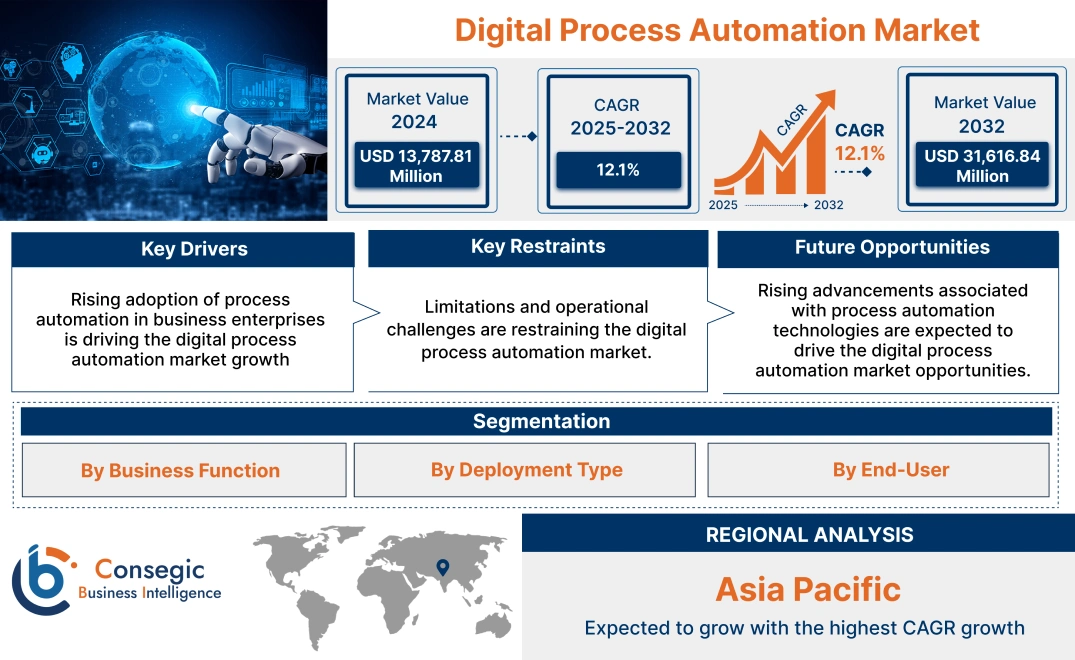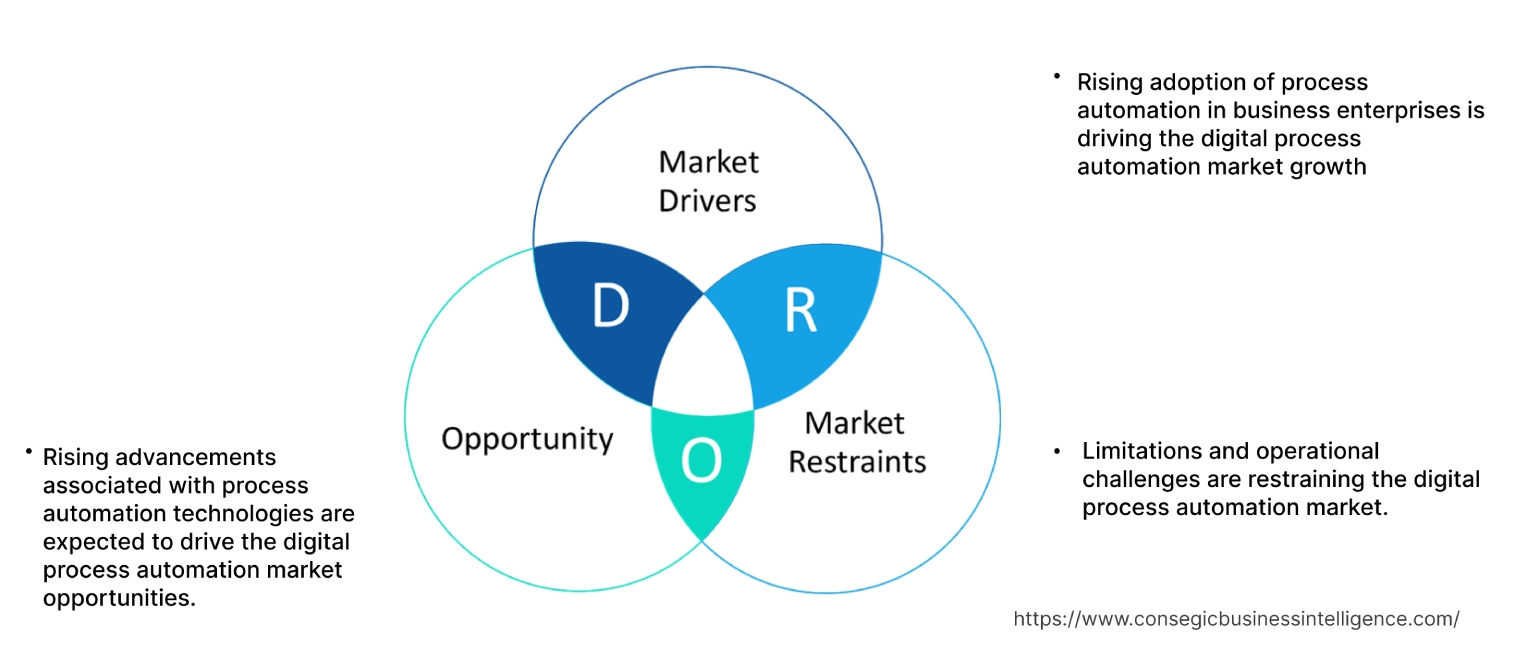Digital Process Automation Market Size:
Digital Process Automation Market size is estimated to reach over USD 31,616.84 Million by 2032 from a value of USD 13,787.81 Million in 2024 and is projected to grow by USD 15,027.33 Million in 2025, growing at a CAGR of 12.1% from 2025 to 2032.
Digital Process Automation Market Scope & Overview:
Digital process automation (DPA) refers to the utilization of digital technologies to automate complex business processes and improve their efficiency, accuracy, and overall effectiveness. It encompasses a broader range of activities, leveraging tools such as artificial intelligence (AI), machine learning, advanced analytics, and others to create seamless, end-to-end processes. Moreover, DPA offers several benefits such as increased operational efficiency, improved accuracy, lower operational costs, increased scalability, and others.
Digital Process Automation Market Dynamics - (DRO) :
Key Drivers:
Rising adoption of process automation in business enterprises is driving the digital process automation market growth
Digital process automation plays a crucial role in business enterprises as they seek to navigate a rapidly changing economic landscape, characterized by technological advancements, evolving customer expectations, and competitive pressure. It streamlines workflows by automating routine tasks, which significantly reduces the time and effort required for manual processes, thereby, leading to higher productivity and more efficient allocation of resources. Moreover, process automation enables quicker response times and more consistent service delivery, which further improves customer satisfaction. Additionally, DPA reduces operational costs associated with manual labor, rework, and inefficiencies within business enterprises. The aforementioned benefits of process automation are primary determinants for driving its adoption among business enterprises.
- For instance, DX Network, one of the UK and Ireland’s key independent logistics network operators wanted to streamline its existing order entry process, which involved inefficient manual data entry practices. DX Network adopted a digital automation solution from ITESOFT. The adoption of a digital automation solution enabled the company to automate invoice processes and sales orders while maximizing OCR read rates, improving processing speeds, and enhancing operational efficiency.
Thus, the rising adoption of process automation solutions in business enterprises is driving the digital process automation market size.
Key Restraints:
Limitations and operational challenges are restraining the digital process automation market.
The implementation of DPA solutions is often associated with certain limitations and operational challenges, which are prime factors constricting market growth.
For instance, the implementation of digital process automation solutions can be complex and it primarily requires significant planning, configuration, and certain technical expertise. Moreover, users may require additional time to learn and adapt to the DPA platform and functionalities. Additionally, the implementation of process automation solutions involves upfront costs for licenses, customization, and infrastructure development. Meanwhile, the updates, ongoing maintenance, and technical support also contribute to additional costs in the overall cost.
Additionally, process automation solutions are also highly susceptible to technical issues. The generation of technical issues may result in server downtime and impact the overall business operations. Further, the deployment of cloud-based process automation solutions is often associated with a higher risk of security threats such as data breaches, cyberattacks, and privacy disclosures as most of the data including sensitive information is stored and processed on the cloud, in turn making the system highly vulnerable to hackers and cyberattacks.
Hence, the above-mentioned limitations and operational challenges associated with the deployment of digital process automation solutions are hindering the digital process automation market expansion.
Future Opportunities :
Rising advancements associated with process automation technologies are expected to drive the digital process automation market opportunities.
DPA solution providers are frequently investing in the development of new technologies to ensure their safe and effective utilization in several industries such as BFSI, manufacturing, healthcare, transportation & logistics, retail & e-commerce, and others for enhanced operational efficiency and minimal human intervention.
- For instance, in June 2022, Ultimus Inc. introduced its latest version of Ultimus Digital Process Automation Suite, which is a low-code business automation platform. The new Ultimus process automation suite version adds significant value for business owners, developers, end users, and administrators with improvements and enhancements that are further designed to increase solution delivery speed, and flexibility. The upgraded process automation suite is optimized to expand administrative and business control, enhance user experience, and offer improved security.
Thus, as per the digital process automation market analysis, rising advancements associated with process automation solutions are anticipated to drive the digital process automation market opportunities.
Digital Process Automation Market Segmental Analysis :
By Business Function:
Based on business function, the market is segmented into sales process automation, supply chain automation, finance and accounting, human resource operations, and others.
Trends in the business function:
- Increasing adoption of sales process automation solutions due to its several benefits including increased efficiency, improved lead management, enhanced customer experience, and others.
- There is a rising trend towards utilization of supply chain automation solutions in manufacturing, retail & e-commerce, and transportation & logistics sectors.
The sales process automation segment accounted for the largest revenue in the total digital process automation market share in 2024.
- Sales process automation refers to the use of technology and software to streamline and enhance various aspects of the sales process.
- Moreover, sales process automation includes automating repetitive tasks, managing customer relationships, tracking leads and opportunities, and facilitating communication among sales team members.
- Additionally, sales process automation helps improve efficiency, reduce manual errors, and provide valuable insights into sales performance.
- For instance, ThinkAutomation offers sales process automation software in its solution offerings. The sales process automation software can automate an organization’s sales process workflows to reduce operational costs and increase customer satisfaction.
- According to the analysis, the rising advancements associated with sales process automation solutions are driving the digital process automation market growth.
The supply chain automation segment is anticipated to register the fastest CAGR growth during the forecast period.
- Supply chain automation involves the utilization of technology and automated processes to enhance the efficiency, visibility, and responsiveness of supply chain management.
- Supply chain automation helps in automating a wide range of activities, including procurement, inventory management, order fulfillment, transportation management, and others.
- Moreover, supply chain automation solutions are designed to optimize the entire supply chain, reduce costs, and improve service levels.
- For instance, Newgen Software Technologies Limited is a process automation solution provider that offers supply chain automation solutions in its portfolio of solutions. The AI-powered supply chain automation solution is designed to optimize and constantly improve supply chain management within an organization to simplify critical processes, improve workforce productivity, and gain operational agility. The supply chain automation solution is capable of streamlining end-to-end processes while ensuring improved collaboration among suppliers, vendors, customers, and partners.
- Therefore, the increasing advancements related to supply chain automation solutions are anticipated to boost the digital process automation market size during the forecast period.
By Deployment Type:
Based on deployment type, the market is segmented into cloud and on-premise.
Trends in the deployment type:
- There is an increasing trend towards the adoption of cloud-based deployment due to its enhanced scalability, flexibility, and rapid implementation capabilities.
- Rising adoption of on-premise deployment due to higher security & privacy, and improved control over server hardware.
The cloud segment accounted for the largest revenue share of 59.68% in the overall digital process automation market share in 2024, and it is anticipated to register the fastest CAGR growth during the forecast period.
- The cloud-based deployment offers a seamless collaboration along with fast and cost-effective access to digital process automation solutions by multiple users irrespective of the time and location of the user.
- Moreover, cloud-based process automation solution provides a range of benefits such as minimal capital expense, rapid implementation, ease of utilization and integration, faster processing, and higher scalability. The above benefits of cloud-based deployment are prime determinants for driving its utilization in the deployment of process automation solutions.
- For instance, Redwood Software offers cloud-based workflow automation software in its solution offerings. The Cloud-based workflow automation software helps in automating repetitive tasks within business enterprises and executing workflow processes in real-time based on detected source files, events, data, messages from apps, and others.
- Therefore, the rising advancements associated with cloud-based process automation software are driving the digital process automation market trends.
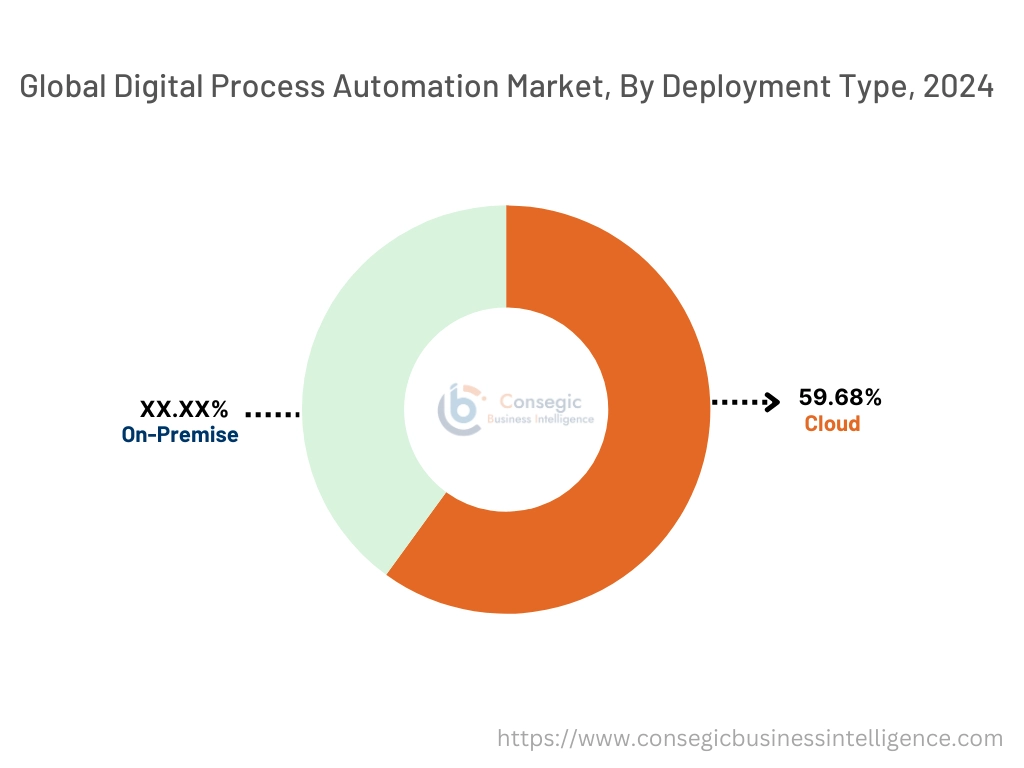
By End-User Industry:
Based on the end user, the market is segmented into BFSI, manufacturing, healthcare, transportation & logistics, retail & e-commerce, IT & telecommunication, and others.
Trends in the end user:
- Factors including rising digitalization of the banking sector, the prevalence of a substantial number of banking/financial firms, and increasing demand for scalable and automated workflows within BFSI firms are key trends fueling the growth of the BFSI segment.
- There is an increasing trend of digitalization and growing consumer demand for online shopping in the retail sector.
The BFSI segment accounted for the largest revenue share of the total market share in 2024.
- This dominance is attributed to the rising adoption of process automation solutions in banking, financial, and insurance firms for automating and optimizing several operations including finance & accounting, loan processing, claims processing, customer onboarding, and other related financial operations.
- Additionally, the utilization of process automation solutions in the BFSI sector offers several benefits including enhanced operational efficiency, improved productivity, and enhanced customer relationships among others.
- For instance, in July 2022, Citi Bank launched its new Citi Commercial Bank in Canada, as a part of the company’s global expansion plan. Citi Commercial Bank offers a wide range of institutional solutions and products to meet the evolving needs of corporates.
- According to the analysis, the rising development of banking firms is increasing the adoption of process automation in BFSI firms for automating and optimizing several operations, in driving the digital process automation market.
The retail & e-commerce segment is anticipated to register a significant CAGR during the forecast period.
- Process automation solutions are primarily used in the retail & e-commerce sector for automating retail operations such as inventory management, supply chain management, order fulfillment, payment processing, and others.
- Moreover, process automation solution enables retail enterprises to automate manual processes, optimize their operations, reduce costs, and enhance the overall experience for customers, in turn leading to improved business performance.
- For instance, according to the U.S. Census Bureau (Department of Commerce), the retail e-commerce sector in the United States was valued at USD 265.95 billion during the third quarter of 2022, representing a significant growth of 10.8% in comparison to USD 239.97 billion during the third quarter of 2021.
- Therefore, the growing retail & e-commerce sector is projected to boost the market during the forecast period.
Regional Analysis:
The regions covered are North America, Europe, Asia Pacific, the Middle East and Africa, and Latin America.
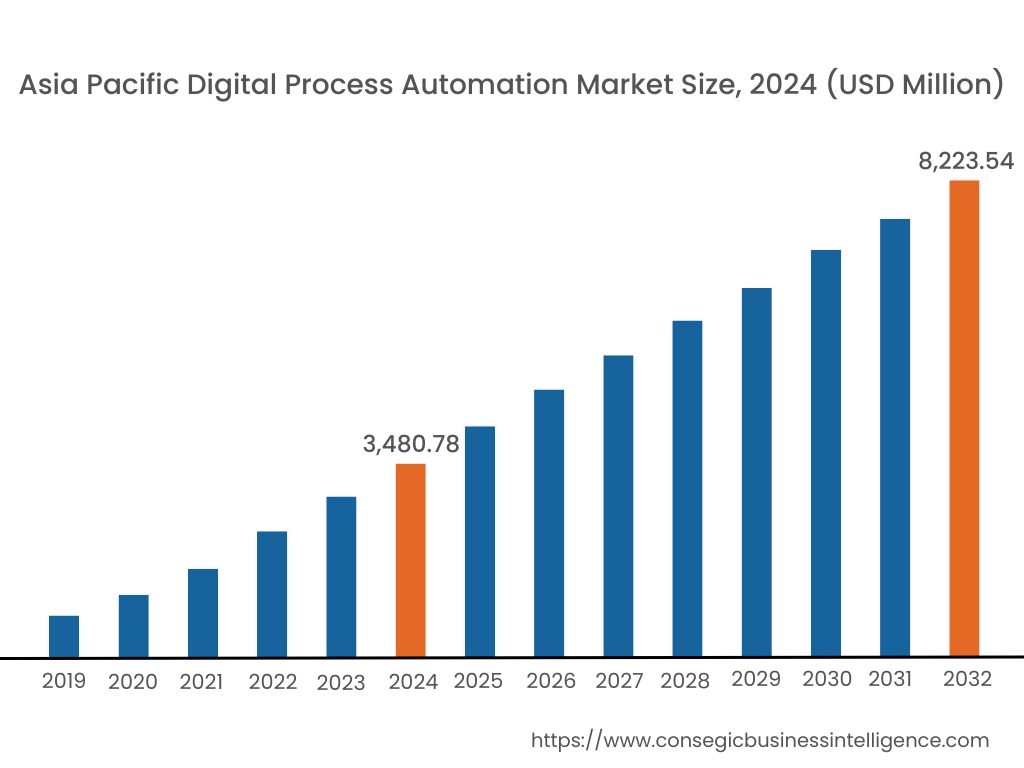
Asia Pacific region was valued at USD 3,480.78 Million in 2024. Moreover, it is projected to grow by USD 3,803.28 Million in 2025 and reach over USD 8,223.54 Million by 2032. Out of this, China accounted for the maximum revenue share of 34.2%. As per the digital process automation market analysis, the adoption of process automation solutions in the Asia-Pacific region is primarily driven by the growing manufacturing, IT & telecommunication, healthcare, and other sectors. Additionally, the increasing development of the retail & e-commerce sector is further accelerating the digital process automation market expansion.
- For instance, in April 2022, the government of India announced its plan to launch an online retail network across 100 Indian cities to provide consumers with an alternative to multinational platforms including Amazon and Flipkart. The above factors are driving the adoption of process automation solutions for automating retail operations such as inventory management, supply chain management, order fulfillment, payment processing, and others, in turn driving the market in the Asia-Pacific region.
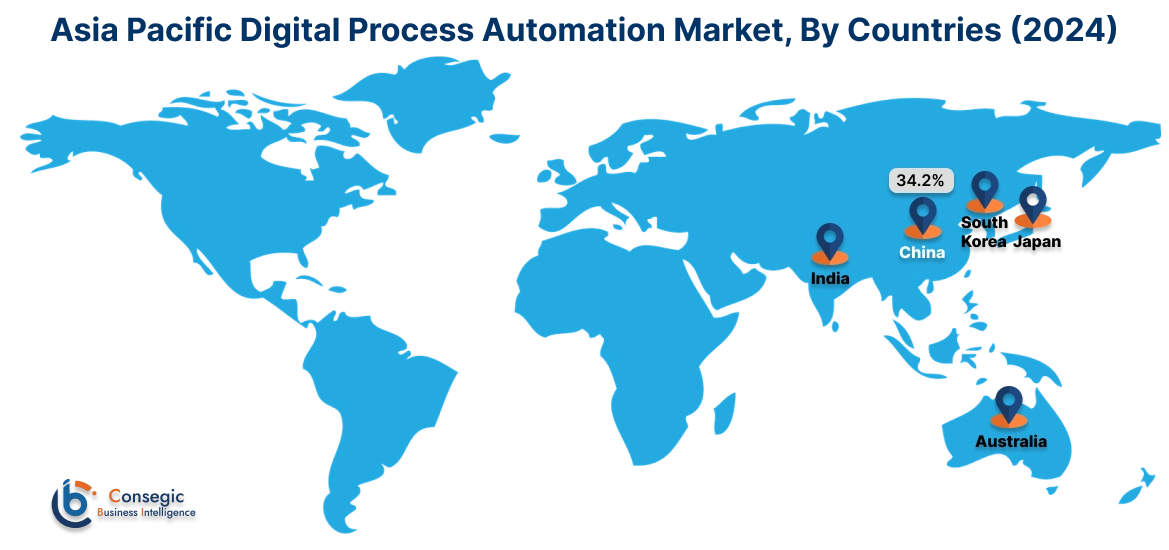
North America is estimated to reach over USD 11,530.66 Million by 2032 from a value of USD 5,023.78 Million in 2024 and is projected to grow by USD 5,475.84 Million in 2025. In North America, the growth of the digital process automation industry is driven by the rising adoption of process automation solutions in BFSI, healthcare, transportation & logistics, and other sectors. Similarly, the rising advancements associated with process automation solutions are contributing to the digital process automation market demand.
- For instance, according to the Federal Deposit Insurance Corporation (FDIC), the United States is comprised of approximately 4,136 commercial banks along with 69,905 total branches across the country as of 2022. The rising development of BFSI firms is increasing the integration of process automation solutions for automating and streamlining BFSI operations, in turn driving the digital process automation market trends in North America.
The regional analysis depicts that the prevalence of a substantial number of BFSI organizations and significant progressions in the transportation & logistics sector are driving the digital process automation market demand in Europe. Furthermore, as per the market analysis, the market demand in Latin America, Middle East, and African regions is expected to grow at a considerable rate due to factors such as increasing investments in the development of manufacturing, retail, and healthcare sectors and rising adoption of process automation solutions within business enterprises for improved operational efficiency.
Top Key Players and Market Share Insights:
The global digital process automation market is highly competitive with major players providing services to the national and international markets. Key players are adopting several strategies in research and development (R&D), product innovation, and end-user launches to hold a strong position in the digital process automation market. Key players in the digital process automation industry include-
- Oracle Corporation (U.S)
- Newgen Software Technologies Ltd. (India)
- Nintex (U.S)
- OpenText Corporation (Canada)
- TIBCO Software Inc. (U.S)
- Bizagi (U.S)
- Appian Corporation (U.S.)
- Pegasystems Inc. (U.S.)
- IBM Corporation (U.S)
- Infosys Limited (India)
Recent Industry Developments :
Partnerships & Collaborations:
- In February 2022, Ricoh announced the acquisition of Axon Ivy along with its process automation solution. The acquisition aims to strengthen the company’s position as a digital services company to ensure sustainable innovation and development.
Mergers & Acquisitions:
- In July 2024, Sandhata, an integrated process automation provider, partnered with Appian, with the aim of combining their strengths in process automation solutions and delivering unparalleled value to their clients.
Digital Process Automation Market Report Insights :
| Report Attributes | Report Details |
| Study Timeline | 2019-2032 |
| Market Size in 2032 | USD 31,616.84 Million |
| CAGR (2025-2032) | 12.1% |
| By Business Function |
|
| By Deployment Type |
|
| By End-User |
|
| By Region |
|
| Key Players |
|
| North America | U.S. Canada Mexico |
| Europe | U.K. Germany France Spain Italy Russia Benelux Rest of Europe |
| APAC | China South Korea Japan India Australia ASEAN Rest of Asia-Pacific |
| Middle East and Africa | GCC Turkey South Africa Rest of MEA |
| LATAM | Brazil Argentina Chile Rest of LATAM |
| Report Coverage |
|
Key Questions Answered in the Report
How big is the digital process automation market? +
The digital process automation market was valued at USD 13,787.81 Million in 2024 and is projected to grow to USD 31,616.84 Million by 2032.
Which is the fastest-growing region in the digital process automation market? +
Asia-Pacific is the region experiencing the most rapid growth in the digital process automation market.
What specific segmentation details are covered in the digital process automation report? +
The digital process automation report includes specific segmentation details for a business function, deployment type, end user, and region.
Who are the major players in the digital process automation market? +
The key participants in the digital process automation market are Oracle Corporation (U.S), Newgen Software Technologies Ltd. (India), Bizagi (U.S), Appian Corporation (U.S.), Pegasystems Inc. (U.S.), IBM Corporation (U.S), Infosys Limited (India), Nintex (U.S), OpenText Corporation (Canada), and TIBCO Software Inc. (U.S).
